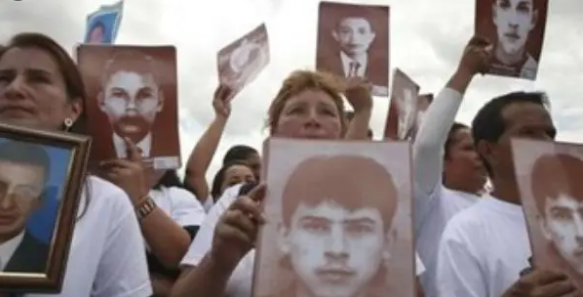Article by PBI-Canada

Photo by EFE.
The Guardian has published a feature article by journalist Mariana Palau about the upcoming trial of former Colombian Army General Mario Montoya that references three groups accompanied by the Peace Brigades International-Colombia Project: the Corporation for Judicial Freedom (CJL), the Network of Human Rights Defenders (dhColombia), and the Peace Community of San José de Apartadó.
The article notes that in October 2002 President Alvaro Uribe ordered General Montoya to attack the FARC guerillas in the city of Medellin. The result was Operation Orion, the largest urban military operation in Colombia’s history.
It continues: “Orion was immediately hailed as a success. The armed forces arrested 355 guerrilla members, raided around 150 properties and liberated 17 hostages. But allegations of extrajudicial killings swiftly followed.”
“In 2003, an NGO that specialises in human rights law, the Corporation for Judicial Freedom, published a report that said 17 civilians were killed and at least 80 more were injured in the operation. Several people were also disappeared.”
“There were also worrying claims that the army had relied on illegal paramilitary groups to gather intelligence in the run-up to Orion. …If Montoya collaborated with them during Orion, it suggested the army was happy to operate beyond the law.”
The article adds: “The operation, which remains controversial to this day, set the terms of debate around Uribe’s democratic security policy.”
PBI-Colombia has previously noted: “Thanks to CJL’s work, in December 2011, Montoya, gave testimony to the Supreme Court of Justice in the prosecution against him for his alleged links to the paramilitaries in carrying out Operation Orion.”
Now, Palau notes that Montoya is being investigated by Colombia’s war crimes tribunal (formally known as the Special Jurisdiction for Peace or JEP) for his role in the false positives (falsos positivos) scandal.
The tribunal, a product of the 2016 peace agreement, is investigating this scandal in which as many as 5,000 people were extrajudicially killed by members of the Colombian army and then falsely labelled as enemy combatants.
A key witness in Montoya’s trial will be Alfamir Castillo whose son Darbey Mosquera was a false positive victim in 2008.
On January 11, 2019, two men on a motorbike fired several rounds at her as she sat in the back of a car in the city of Cali. She survived the attack because of the bulletproof car that had been provided to her by the state National Protection Unit.
Her lawyer is Germán Romero, a member of dhColombia which has been accompanied by PBI-Colombia since 2009.
While Palau reports that the tribunal will not evaluate Montoya’s possible role in the massacre of five adults and three children in the Peace Community of San José de Apartadó in February 2005, “if he is found to have had a role in the extrajudicial killings, he could be sentenced to up to 20 years in prison.”
The article concludes: “Montoya’s trial – which, because of the coronavirus pandemic, has been postponed until next year – will have huge political implications.”
Meanwhile, Reynaldo Villalba, a lawyer with the José Alvear Restrepo Lawyers’ Collective (CCAJAR), is representing Senator Iván Cepeda in legal proceedings against Uribe. The Committee in Solidarity with Political Prisoners (CSPP) and Franklin Castañeda have also filed a lawsuit for slander and harassment against Uribe.
Additionally, Daniel Prado, a lawyer with the Inter-Church Justice and Peace Commission (CIJP), is representing the family of Camilo Barrientos who was allegedly murdered by a paramilitary group that Uribe’s brother Santiago is accused of bankrolling.
PBI-Colombia also accompanies CCAJAR, CSPP and CIJP.
The full article by Mariana Palau in The Guardian can be read at The ‘false positives’ scandal that felled Colombia’s military hero.

